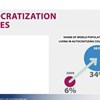democratically
Are public decisions made by artificial intelligence democratically okay?
Are public decisions made by artificial intelligence democratically okay?The reason this is an important question is that already AI is being used in public decision-making. For example, in social ser
Demographically Based Global Income Forecast up to the Year 2050
Demographic projections of age structure and correlations with GDP and GDP growth are used to study the forecasting properties of demographically based models. Extending the forecasts to 2050 suggests

Anna Lührmann: Walking the Talk. Which Parties Threaten Democracy?
The recent increase of democratic declines around the world has sparked a new generation of studies on the topic. Scholars agree that these days the main threat to democracy arises from democratically
Bo Rothstein: A social science dilemma. Is there a contradiction between democracy and quality of government?
Research seminar with Bo Rothstein.AbstractMost definitions of democracy rely on a set of procedural rules for how political power should be accessed legitimately. The basic norm for these procedural ru realized by equal democratic rights. In this understanding of political legitimacy, democracy is a “partisan game” where various interests are given fair possibilities to compete for political power. The concept of “quality of government” relates to the legitimacy in the of political power and is based on the norm of that is the opposite of partisanship. This is to be realized by, for example, the rule of law and a public administration built on meritocracy. Several tensions between these two bases for achieving political legitimacy will be present. For example, a democratically elected government may want to politicize the public administration and may establish public services and benefits directed only to their political supporters. The rule of law includes the principle of equality before the law, but a democratically elected government may take actions that put itself “above” the law. Various empirical measures and philosophical principles for understanding these type of tensions between democracy and the quality of government will be presented in this lecture.

Bo Rothstein: Is there a contradiction between democracy and quality of government?
Most definitions of democracy rely on a set of procedural rules for how political power should be accessed legitimately. The basic norm for these procedural rules is according to noted democracy theor
Three Mistakes in the Moral Reasoning About the Covid-19 Pandemic
Institute for Futures Studies Working Paper Series 2020:12 Abstract The response to the Covid-19 pandemic, and the public discourse about the pandemic, can be used to illustrate three common mistakes in
Three Mistakes in the Moral Reasoning About the Covid-19 Pandemic
Orri Stefánsson, philosopher at the Institute for Futures Studies and decision theorist, dissects the moral reasoning about the Covid-19 pandemic. (This text is part of the Institute for Futures Studie)
The Demos and Its Critics
The Review of Politics, 81(3), 435-457. doi:10.1017/S0034670519000214 Abstract The “demos paradox” is the idea that the composition of a demos could never secure democratic legitimacy because the composi
An Ombudsman for Future Generations, Legitimate and Effective?
in: Institutions For Future Generations, Iñigo González-Ricoy and Axel Gosseries (red.), Oxford: Oxford University Press. 117-134. This chapter examines the possibility to establish ombudsmen as instr
Albert Weale: Democracy Across Time
Albert Weale, Emeritus Professor of Political Theory and Public Policy at University College London. AbstractMany democratically made choices involve commitments across time. International obligations,








